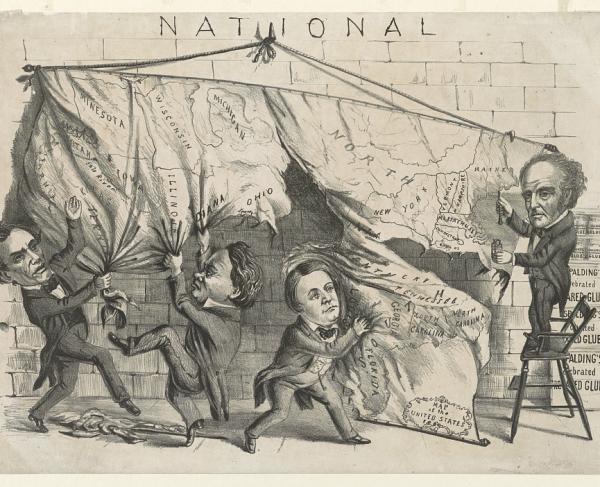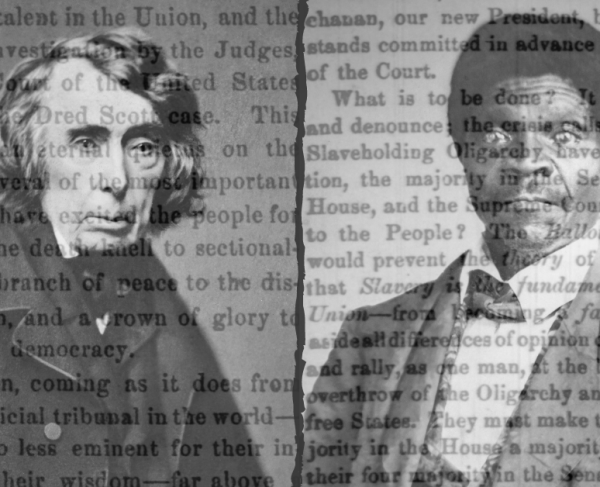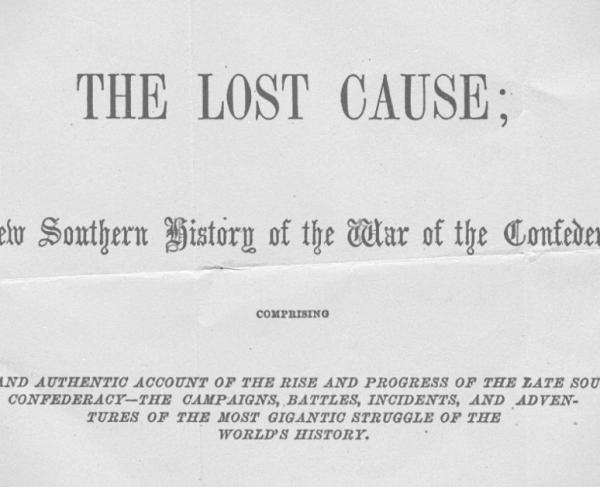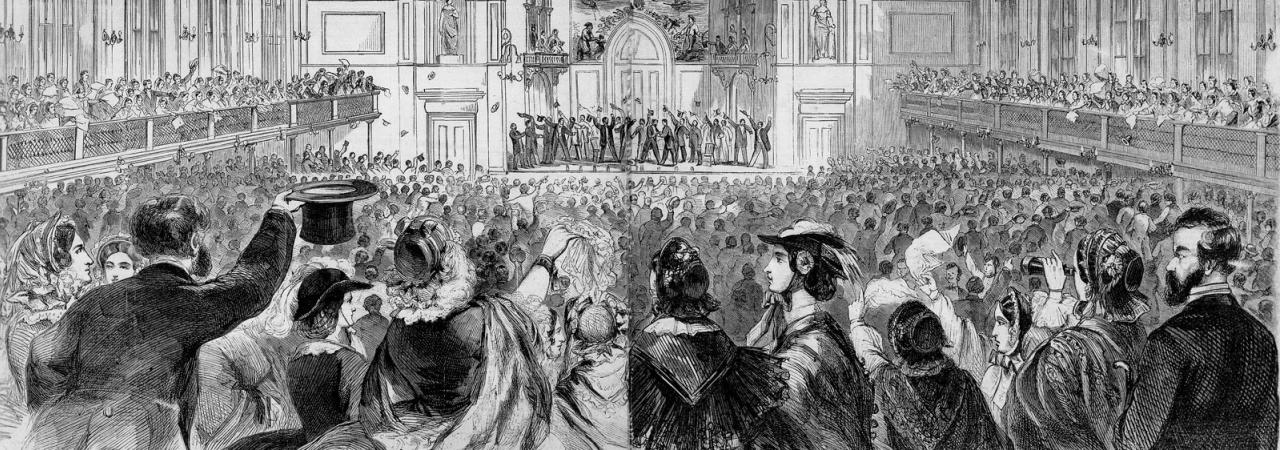
Mass meeting endorsing the call for secession, Charleston, South Carolina.
John Pierce
The root cause of the American Civil War is perhaps the most controversial topic in American history. Even before the war was over, scholars in the North and South began to analyze and interpret the reasons behind the bloodshed.
The scholars immediately disagreed over the causes of the war and disagreement persists today. Many maintain that the primary cause of the war was the Southern states’ desire to preserve the institution of slavery. Others minimize slavery and point to other factors, such as taxation or the principle of States' Rights.
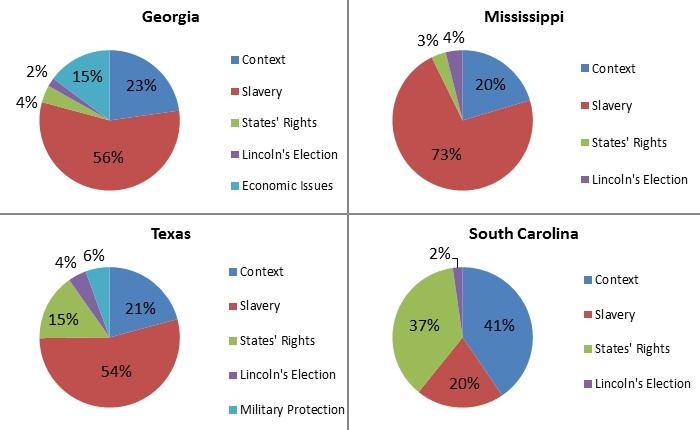
In 2011, at the outset of the sesquicentennial, a Pew Research Center poll found that Americans were significantly divided on the issue, with 48% saying the war was "mainly about states' rights," 38% saying the war was "mainly about slavery," with the remainder answering "both equally" or "neither/don't know."
One method by which to analyze this historical conflict is to focus on primary sources. Every state in the Confederacy issued an “Article of Secession” declaring their break from the Union. Four states went further. Texas, Mississippi, Georgia and South Carolina all issued additional documents, usually referred to as the “Declarations of Causes," which explain their decision to leave the Union.
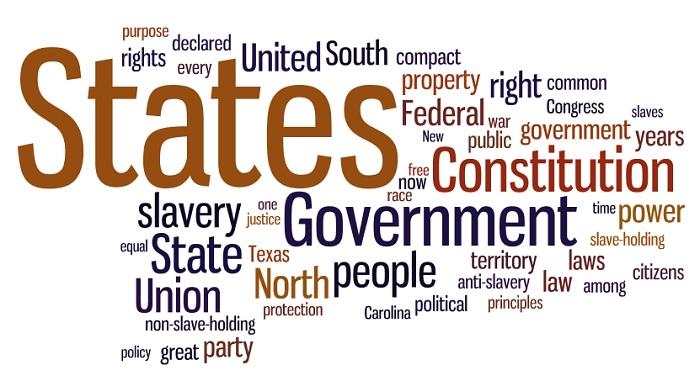
Two major themes emerge in these documents: slavery and states' rights. All four states strongly defend slavery while making varying claims related to states' rights. Other grievances, such as economic exploitation and the role of the military, receive limited attention in some of the documents. This article will present, in detail, everything that was said in the Declarations of Causes pertaining to these topics.
Slavery
1) Each declaration makes the defense of slavery a clear objective.
Mississippi: Our position is thoroughly identified with the institution of slavery-- the greatest material interest of the world. Its labor supplies the product which constitutes by far the largest and most important portions of commerce of the earth… These products have become necessities of the world, and a blow at slavery is a blow at commerce and civilization. That blow has been long aimed at the institution, and was at the point of reaching its consummation. There was no choice left us but submission to the mandates of abolition, or a dissolution of the Union, whose principles had been subverted to work out our ruin.
Texas: The servitude of the African race, as existing in these States, is mutually beneficial to both bond and free, and is abundantly authorized and justified by the experience of mankind, and the revealed will of the Almighty Creator, as recognized by all Christian nations.
South Carolina: Those [Union] States have assumed the right of deciding upon the propriety of our domestic institutions; and have denied the rights of property established in fifteen of the States and recognized by the Constitution; they have denounced as sinful the institution of slavery; they have permitted open establishment among them of societies, whose avowed object is to disturb the peace and to eloign the property of the citizens of other States.
Georgia: That reason was [the North's] fixed purpose to limit, restrain, and finally abolish slavery in the States where it exists. The South with great unanimity declared her purpose to resist the principle of prohibition to the last extremity.
2) Some states argue that slavery should be expanded.
Georgia: We had acquired a large territory by successful war with Mexico; Congress had to govern it; how, in relation to slavery, was the question then demanding solution. Northern anti-slavery men of all parties asserted the right to exclude slavery from the territory by Congressional legislation and demanded the prompt and efficient exercise of this power to that end. This insulting and unconstitutional demand was met with great moderation and firmness by the South. We had shed our blood and paid our money for its acquisition; we demanded a division of it… or an equal participation in the whole of it. The price of the acquisition was the blood and treasure of both sections-- of all, and, therefore, it belonged to all upon the principles of equity and justice.
Texas: The controlling majority of the Federal Government, under various pretenses and disguises, has so administered the same as to exclude the citizens of the Southern States, unless under odious and unconstitutional restrictions, from all the immense territory owned in common by all the States on the Pacific Ocean, for the avowed purpose of acquiring sufficient power in the common government to use it as a means of destroying the institutions of Texas and her sister slaveholding States.
3) Abolitionism is attacked as a method of inciting violent uprisings.
Georgia: For twenty years past the abolitionists and their allies in the Northern States have been engaged in constant efforts to subvert our institutions and to excite insurrection and servile war among us. … These efforts have in one instance led to the actual invasion of one of the slave-holding States, and those of the murderers and incendiaries who escaped public justice by flight have found fraternal protection among our Northern confederates.
Mississippi: [Abolitionism] advocates negro equality, socially and politically, and promotes insurrection and incendiarism in our midst. It has enlisted its press, its pulpit and its schools against us, until the whole popular mind of the North is excited and inflamed with prejudice.
Texas: The people [of non-slave holding states] have formed themselves into a great sectional party, now strong enough in numbers to control the affairs of each of those States, based upon an unnatural feeling of hostility to these Southern States and their beneficent and patriarchal system of African slavery, proclaiming the debasing doctrine of equality of all men, irrespective of race or color-- a doctrine at war with nature, in opposition to the experience of mankind, and in violation of the plainest revelations of Divine Law. They demand the abolition of negro slavery throughout the confederacy, the recognition of political equality between the white and negro races, and avow their determination to press on their crusade against us, so long as a negro slave remains in these States... They have, through the mails and hired emissaries, sent seditious pamphlets and papers among us to stir up servile insurrection and bring blood and carnage to our firesides.
4) Mississippi and Georgia point out that slavery accounts for a huge portion of the Southern economy.
Mississippi: We must either submit to degradation, and to the loss of property worth four billions of money, or we must secede from the Union framed by our fathers, to secure this as well as every other species of property.
Georgia: But they know the value of parchment rights in treacherous hands, and therefore they refuse to commit their own to the rulers whom the North offers us. Why? Because by their declared principles and policy they have outlawed $3,000,000,000 of our property in the common territories of the Union; put it under the ban of the Republic in the States where it exists and out of the protection of Federal law everywhere.
States' Rights
1) The states argue that the Union is a compact, one that can be annulled if the states are not satisfied with what they receive in return from other states and/or from the federal government.
South Carolina: We hold...that the mode of its [the federal government] formation subjects it to a third fundamental principle, namely: the law of compact. We maintain that in every compact between two or more parties, the obligation is mutual; that the failure of one of the contracting parties to perform a material part of the agreement, entirely releases the obligation of the other; and that where no arbiter is provided, each party is remitted to his own judgment to determine the fact of failure, with all its consequences.
Georgia: Our Constitution wisely gives Congress the power to punish all offenses against the laws of nations. These are sound and just principles which have received the approbation of just men in all countries and all centuries; but they are wholly disregarded by the people of the Northern States, and the Federal Government is impotent to maintain them.
2) The states argue that the North's reluctance to enforce the Fugitive Slave Act of 1850 (mandating that fugitive slaves be returned to the South) means that the compact is no longer satisfactory.
South Carolina: In the state of New York even the right of transit for a slave has been denied by her tribunals; and the States of Ohio and Iowa have refused to surrender to justice fugitives charged with murder, and with inciting servile insurrection in the State of Virginia. Thus the constituted compact has been deliberately broken and disregarded by the non-slaveholding States, and the consequence follows that South Carolina is released from her obligation.
Texas: The States… by solemn legislative enactments, have deliberately, directly or indirectly violated the 3rd clause of the 2nd section of the 4th article [the Fugitive Slave Clause] of the federal constitution, and laws passed in pursuance thereof; thereby annulling a material provision of the compact, designed by its framers to perpetuate the amity between the members of the confederacy and to secure the rights of the slave-holding States in their domestic institutions-- a provision founded in justice and wisdom, and without the enforcement of which the compact fails to accomplish the object of its creation.
Other Grievances
1) All of the states negatively mention Abraham Lincoln's election and his suspected abolitionist leanings.
Georgia: This is the party to whom the people of the North have committed the Government. They raised their standard in 1856 and were barely defeated. They entered the Presidential contest again in 1860 and succeeded. The prohibition of slavery in the Territories, hostility to it everywhere, the equality of the black and white races, disregard of all constitutional guarantees in its favor, were boldly proclaimed by its leaders and applauded by its followers.
South Carolina: On the 4th day of March next, this party will take possession of the Government. It has announced that the South shall be excluded from the common territory, that the judicial tribunals shall be made sectional, and that a war must be waged against slavery until it shall cease throughout the United States.
Texas: And, finally, by the combined sectional vote of the seventeen non-slave-holding States, they have elected as president and vice-president of the whole confederacy two men whose chief claims to such high positions are their approval of these long continued wrongs, and their pledges to continue them to the final consummation of these schemes for the ruin of the slave-holding States.
Mississippi: It has recently obtained control of the Government, by the prosecution of its unhallowed schemes, and destroyed the last expectation of living together in friendship and brotherhood. Utter subjugation awaits us in the Union, if we should consent longer to remain in it.
2) Georgia accuses Northern manufacturing interests of exploiting the South and dominating the federal government.
Georgia: The material prosperity of the North was greatly dependent on the Federal Government; that of the South not at all. In the first years of the Republic the navigating, commercial, and manufacturing interests of the North began to seek profit and aggrandizement at the expense of the agricultural interests. Even the owners of fishing smacks sought and obtained bounties for pursuing their own business (which yet continue), and $500,000 is now paid them annually out of the Treasury. The navigating interests begged for protection against foreign shipbuilders and against competition in the coasting trade. Congress granted both requests, and by prohibitory acts gave an absolute monopoly of this business to each of their interests, which they enjoy without diminution to this day. Not content with these great and unjust advantages, they have sought to throw the legitimate burden of their business as much as possible upon the public; they have succeeded in throwing the cost of light-houses, buoys, and the maintenance of their seamen upon the Treasury, and the Government now pays above $2,000,000 annually for the support of these objects. Theses interests, in connection with the commercial and manufacturing classes, have also succeeded, by means of subventions to mail steamers and the reduction in postage, in relieving their business from the payment of about $7,000,000 annually, throwing it upon the public Treasury under the name of postal deficiency. The manufacturing interests entered into the same struggle early, and has clamored steadily for Government bounties and special favors. This interest was confined mainly to the Eastern and Middle non-slave-holding States. Wielding these great States it held great power and influence, and its demands were in full proportion to its power. The manufacturers and miners wisely based their demands upon special facts and reasons rather than upon general principles, and thereby mollified much of the opposition of the opposing interest. They pleaded in their favor the infancy of their business in this country, the scarcity of labor and capital, the hostile legislation of other countries toward them, the great necessity of their fabrics in the time of war, and the necessity of high duties to pay the debt incurred in our war for independence. These reasons prevailed, and they received for many years enormous bounties by the general acquiescence of the whole country.
3) Texas expresses dissatisfaction with federal military protection.
Texas: The Federal Government, while but partially under the control of these our unnatural and sectional enemies, has for years almost entirely failed to protect the lives and property of the people of Texas against the Indian savages on our border, and more recently against the murderous forays of banditti from the neighboring territory of Mexico; and when our State government has expended large amounts for such purpose, the Federal Government has refuse reimbursement therefor, thus rendering our condition more insecure and harassing than it was during the existence of the Republic of Texas.
Debates concerning the true causes of the Civil War are unlikely to cease. Historians often cherry-pick evidence that supports preconceived notions while ignoring large quantities of contradictory material. When that impulse is fueled by a fervent desire to find reconciliation and consensus, as was the case after the Civil War, the work of historians becomes especially murky. Primary sources such as the Declarations of Causes are essential to a balanced study of history.
